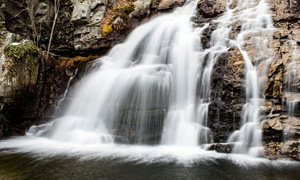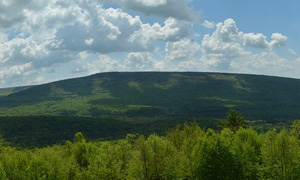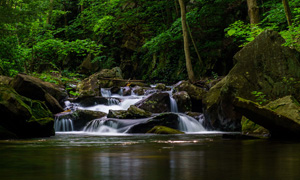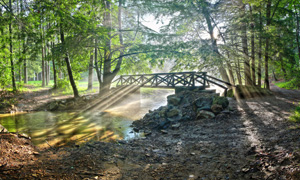What is one of the greatest barriers for both young and old to participate in outdoor recreation? Lack of transportation.
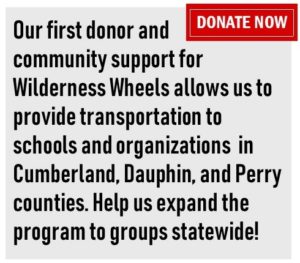 Thanks to Wilderness Wheels, PPFF’s new donor-funded transportation scholarship program, students in grades K-12 at a Title I school; youth participating in a community enrichment program such as Big Brothers/Big Sisters, the local Y, etc.; and seniors attending programs at their local senior centers are eligible to apply for funding to overcome this hurdle. Grantees are then able to use the Pennsylvania state parks and forests for experiential learning, leadership development, team building, career exploration, or recreation skills development. Through this exciting new scholarship program, the Pennsylvania Parks and Forests Foundation offers a new way to access the outdoors, creating lifelong healthy living skills and developing outdoor leadership.
Thanks to Wilderness Wheels, PPFF’s new donor-funded transportation scholarship program, students in grades K-12 at a Title I school; youth participating in a community enrichment program such as Big Brothers/Big Sisters, the local Y, etc.; and seniors attending programs at their local senior centers are eligible to apply for funding to overcome this hurdle. Grantees are then able to use the Pennsylvania state parks and forests for experiential learning, leadership development, team building, career exploration, or recreation skills development. Through this exciting new scholarship program, the Pennsylvania Parks and Forests Foundation offers a new way to access the outdoors, creating lifelong healthy living skills and developing outdoor leadership.
The scholarship program covers the cost of transportation to/from the park/forest for programs outlined below. The park/forest visit must be a part of a larger educational initiative and requires park/forest staff be involved at the destination location.
Our parks and forests offer an opportunity to explore nature, provide hands-on environmental learning opportunities, develop leadership skills, connect youth and seniors to our rich cultural legacy, and develop recreational skills that can make them healthier.
 Why engage youth and engage seniors in the great outdoors?
Why engage youth and engage seniors in the great outdoors?
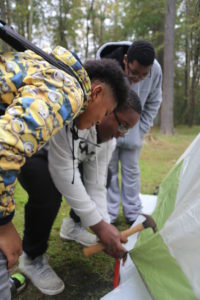 Explore, play, and learn about nature… For the health of our economy and our nation’s public lands, it’s critical that we work to establish deep, meaningful connections between young people – from every background and every community – and America’s great outdoors. Exploring the outdoors is a great opportunity to actively engage youth in learning and provides a means for applying knowledge learned in the classroom.
Explore, play, and learn about nature… For the health of our economy and our nation’s public lands, it’s critical that we work to establish deep, meaningful connections between young people – from every background and every community – and America’s great outdoors. Exploring the outdoors is a great opportunity to actively engage youth in learning and provides a means for applying knowledge learned in the classroom.
Likewise, our senior population benefits from spending time outdoors, but often lack transportation to explore the areas that once held meaning for them.
Physical and psychological well being… The health and wellness of current and future generations, the health of our communities and society, and the economy of the future are all dependent on people experiencing a personal, direct and ongoing relationship with the natural world.
Children are spending less time than ever before in the great outdoors. Television, video games, homework, computers, the internet, busy families and strained budgets all conspire to reduce our children’s exposure to nature. Sedentary activities are, of course, linked with the rise in childhood obesity. According to the Centers for Disease Control, childhood obesity has more than doubled in children and quadrupled in adolescents in the past 30 years.
For our seniors, research shows that spending time outdoors reduces stress, improves memory, and can reduce the impacts of age-related diseases such as arthritis. Additionally, increased activity at any age leads to greater physical, mental, and emotional health.
Stewardship… It’s difficult to be a voice for conservation or to be engaged in stewardship if one lacks a connection to the land or fails to understand the interconnectedness of our air, land, and water systems to human needs. This need for community and connection is true at every stage of life. By cultivating this connection, by developing leadership skills, and by building awareness, we begin to grow stewards in the young and perhaps recapture a lost connection for our seniors to the benefit of our state parks; our forests, air, and water; and the world around us.
Future Scientists, Engineers, and Teachers… Creative exploration and hands on participation in nature during childhood can set youth on a trajectory to a lifelong fascination with, and participation in, numerous areas of biological, chemical, physical, and earth sciences. Opportunities for career exploration in our state parks and forests may inspire rangers, engineers, skilled trades, and so much more! And if those future scientists, engineers, and teachers should happen to come in contact with elders who once held those positions through a multi-generational project, an even stronger bond is formed.
Creative, Critical Thinking… Taking the learning experience outdoors has been shown to increase a child’s creativity and problem-solving skills. Just being in the open air allows each of us a literal out of the box opportunity to learn to deal with different situations, solve problems as they arise, and adapt to changing circumstances. For the older person, once he or she has been assured that the situation is safe and non-threatening, there is a confidence that comes with remembering the younger self who was perhaps once more skilled and adventurous.
Why Pennsylvania State Parks and Forests?
With 124 state parks and 2.2 million acres of state forest, many opportunities exist for exploration and learning. Preserving both cultural and natural resources, this network of parks and forests lends itself to applied learning in almost any discipline. Our state parks and forests offer free admission, not just for school programs but all year long, so young people who participate in a program can return with their families. Our parks and forests offer free programs by trained educators, allowing youth and seniors to participate on their own time not just with an organized group once they develop their passion for these special places.
Our park and forests offer different ecosystems—lakes, rivers, mountains, beaches, barrens, prairies, etc. which support a myriad of wildlife and plants, offering a microcosm of the world’s environments.
Our parks and forests are natural classrooms bursting with opportunity for students to capture their fascination with science, history, leadership, and recreation. All we need to is get them outdoors!
Getting students outside stimulates imagination, creativity and investigation, and enables them to connect with nature, experience the seasons and see how parks and forests change over time.
Many of our parks and forests also offer great history lessons (opportunities to learn about Lumber, Agriculture, the Civilian Conservation Corps, etc.) A list of state parks and forests boasting at least seasonal educational staff and an interest in participating in Wilderness Wheels is attached.
Eligibility and Eligible Programs
See the application for additional information on what qualifies and how to apply. Applications can be submitted:
- By printing out the application (review list of participating state parks and forests) and emailing it to [email protected]; or
- By completing the online form below.
Wilderness Wheels grants are awarded based on the following criteria
- Teachers/program administers must contact the park or forest and agree on a date before submitting an application. Submission of an application does not guarantee that the park/forest will be able to accommodate all requests.
- School/students financial needs – the program is for Title I schools that have at least 50% of the student population qualifying for the free or reduced lunch program and for community service programs and senior programs.
- Educational goals for the trip are identified.
- The visit provides a program identified as a priority.
- Visit is a part of a larger curriculum or segment of study.
Contacting State Parks and Forests
- A list of participating state parks and forests is attached.
- Teachers/program administrators must schedule a visit directly with the park/forest.
- Parks/forests on this list have verified their general availability to provide programs for school groups.
- Parks/forests staff may not be able to accommodate all requests.
- Parks/forests staff may apply on behalf of the school/program.
Application Timeline
- September thru November trips
- Applications accepted from May 1 to September 15.
- Applications will be reviewed and awards will be announced at the end of September.
- April and May trips
- Applications accepted from November 1 to March 1.
- Applications will be reviewed and awards will be announced at the end of March.
- Summer programming
- Applications accepted May 1 thru July 1.
- Winter trips: Contact PPFF for more information

